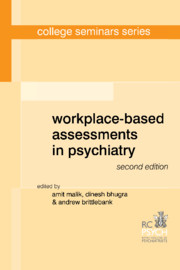Book contents
- Frontmatter
- Contents
- List of tables, boxes and figures
- List of contributors
- Preface
- 1 Introduction: changes in training
- 2 Workplace-based assessment methods: literature overview
- 3 Case-based discussion
- 4 The mini-Assessed Clinical Encounter (mini-ACE)
- 5 The Assessment of Clinical Expertise (ACE)
- 6 Multi-source feedback
- 7 Direct Observation of Non-Clinical Skills: a new tool to assess higher psychiatric trainees
- 8 Workplace-based assessments in psychotherapy
- 9 Educational supervisor's report
- 10 Portfolios
- 11 Annual Review of Competence Progression (ARCP)
- 12 Examinations in the era of competency training
- 13 Piloting workplace-based assessments in psychiatry
- 14 Developing and delivering an online assessment system: Assessments Online
- 15 A trainee perspective of workplace-based assessments
- 16 Conclusions
- Appendix 1 Assessment forms
- Appendix 2 Guide for ARCP panels in core psychiatry training
- Appendix 3 The MRCPsych examination
- Index
8 - Workplace-based assessments in psychotherapy
Published online by Cambridge University Press: 01 January 2018
- Frontmatter
- Contents
- List of tables, boxes and figures
- List of contributors
- Preface
- 1 Introduction: changes in training
- 2 Workplace-based assessment methods: literature overview
- 3 Case-based discussion
- 4 The mini-Assessed Clinical Encounter (mini-ACE)
- 5 The Assessment of Clinical Expertise (ACE)
- 6 Multi-source feedback
- 7 Direct Observation of Non-Clinical Skills: a new tool to assess higher psychiatric trainees
- 8 Workplace-based assessments in psychotherapy
- 9 Educational supervisor's report
- 10 Portfolios
- 11 Annual Review of Competence Progression (ARCP)
- 12 Examinations in the era of competency training
- 13 Piloting workplace-based assessments in psychiatry
- 14 Developing and delivering an online assessment system: Assessments Online
- 15 A trainee perspective of workplace-based assessments
- 16 Conclusions
- Appendix 1 Assessment forms
- Appendix 2 Guide for ARCP panels in core psychiatry training
- Appendix 3 The MRCPsych examination
- Index
Summary
To many, psychotherapy represents the least medical end of the continuum of skills that make up psychiatric competence. Training in the area has often been patchy and although most people accept the value of the psychotherapy experience for trainees, the practical difficulties within the organisation often limit the exposure that trainees can obtain. Recently, the Royal College of Psychiatrists has modernised and updated its curriculum and this has happened as much for psychotherapy as for other topic areas.
The modernised psychotherapy curriculum, as it applies to basic trainees, focuses on two core areas where psychotherapeutic competencies are important. The easiest of these to define is the aim that trainees should have a basic knowledge of the main modalities of psychotherapy, be able to implement basic psychotherapeutic strategies and techniques, and be rational prescribers of psychological treatments. To that end trainees are asked to acquire theoretical knowledge in the field of psychotherapy and also to gain practical experience in the treatment of two patients. These should be in two different modalities and of two different durations. Each of these cases should be formally evaluated and submitted as a workplacebased assessment.
The second area that the psychotherapy curriculum tries to develop is what can be termed ‘the psychotherapeutic attitude’. This represents a way of approaching the experience and difficulties of patients that is at the same time empathic, developmental, narrative and psychologically literate. In the psychotherapeutic attitude relatively more weight is given to ideographic (drawing on themes and narratives) than to nomothetic (drawing on statistical or categorical) explanations, and care and effort are expended in developing and maintaining emotional and mental closeness with patients. The capacities that comprise this attitude are core to the practice of all psychiatric specialties. Helping trainees to develop the psychotherapeutic attitude is a broadly based enterprise that will occur in all areas of training but in the specific area of psychotherapy the mechanism of the case-based discussion is used both as a training and an evaluative tool and is the focus of the second main workplace-based assessment in psychotherapy.
- Type
- Chapter
- Information
- Workplace-Based Assessments in Psychiatry , pp. 84 - 98Publisher: Royal College of PsychiatristsPrint publication year: 2011

